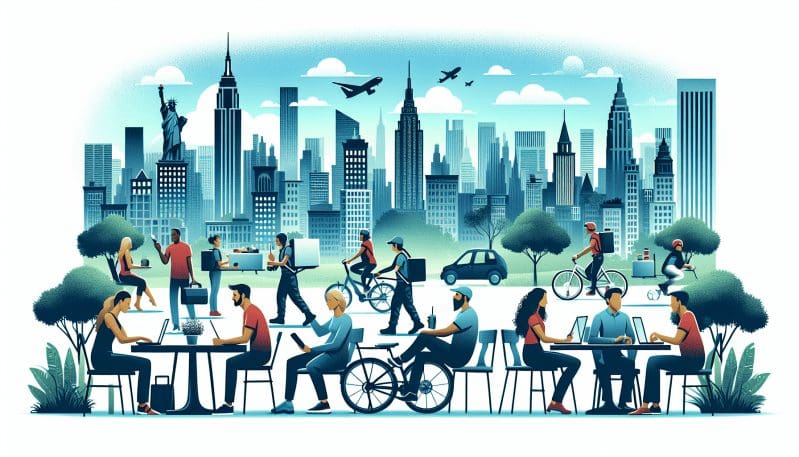In the bustling streets of New York, where the traditional 9-to-5 work rhythm has long been the heartbeat of the city, a new contender has emerged – the gig economy. This modern labor market, characterized by short-term contracts and freelance work, has not just nudged but elbowed its way into the mainstream, causing a seismic shift in the conventional employment model that has stood the test of time.
The gig economy promises flexibility, autonomy, and the allure of entrepreneurial freedom. For many, it represents a departure from the rigid structure of office hours, offering the ability to work when and where they choose. Yet, this independence often comes at the cost of worker rights, benefits, and job security that have been the hallmarks of traditional employment.
New York, a city renowned for its adaptability and innovation, is at the forefront of this transformation. Businesses here are increasingly leveraging gig workers to navigate the ebb and flow of market demands. This agility has its perks, allowing companies to scale labor needs up or down without the encumbrances of traditional employment contracts. However, as these businesses adapt, questions arise about the future of the workforce.
The rise of the gig economy has sparked an intense debate. Proponents argue that it embodies the future of work, providing workers the freedom to build a mosaic of jobs that cater to their lifestyles and career aspirations. Conversely, critics point to the erosion of stable employment, highlighting the precarious nature of gig work where income is unpredictable, and worker protections are oftentimes scant.
Worker rights and protections, once considered a standard, are now a pressing concern. In the gig economy, health insurance, retirement plans, paid leave, and unemployment benefits – perks that were once assured – are now elusive for many. This has prompted action from local governments, labor unions, and advocacy groups in New York, seeking to implement regulations that ensure fair employment practices are upheld.
For instance, New York City has taken steps to protect rideshare drivers, setting a minimum wage and addressing their right to a livable income. These initiatives point to the local government’s recognition of the evolving work landscape and their role in shaping policies that protect worker interests while fostering economic growth.
It is crucial to continue this conversation and investigation into how the gig economy is reshaping the labor market. We must balance the innovative progress it brings with the foundational need for stability and protection in the workforce. The question remains: Should the gig economy be celebrated as a progressive step towards modern work-life balance, or should we heed caution, viewing it as a potential regression in our commitment to uphold worker protections?
New York businesses and their workforce are at a crossroads. As they navigate the challenges and opportunities presented by the gig economy, they will set a precedent for the rest of the nation. This is not merely a business trend but a societal shift that requires our careful attention and thoughtful regulation to ensure that the future of work is as promising as it is flexible. The conversation has just begun, and The Work Times is here to keep you informed and engaged every step of the way.




























